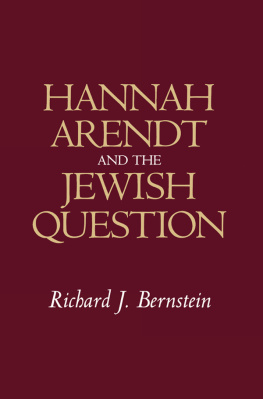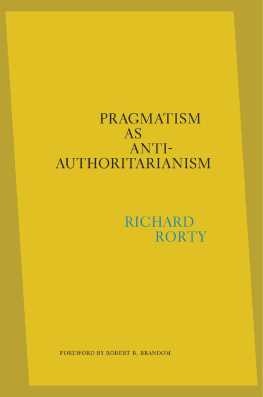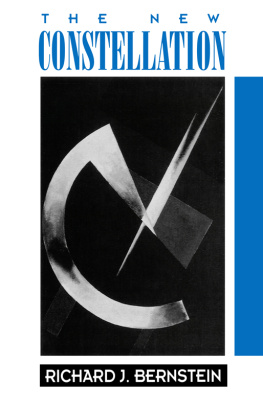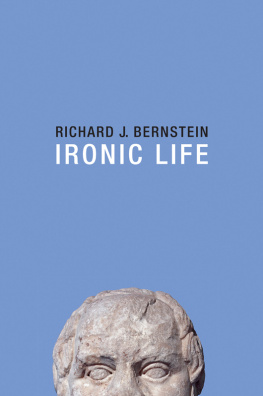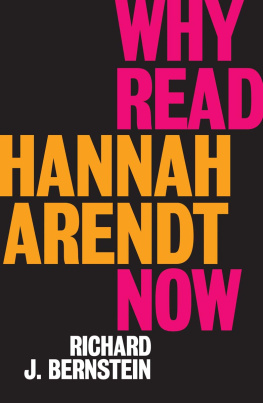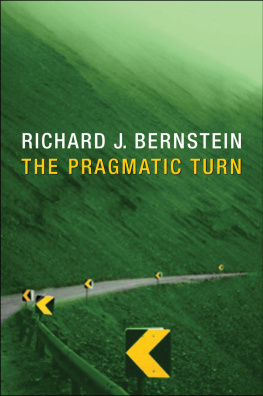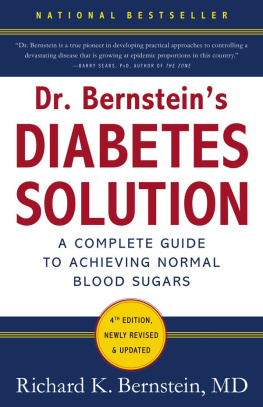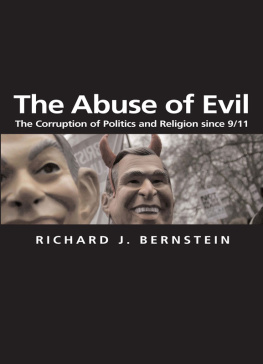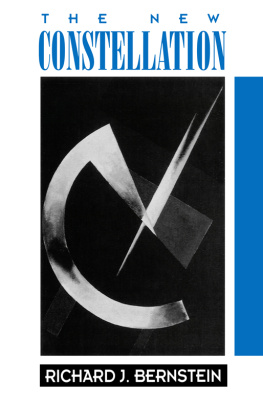Bernstein Richard J. - Hannah Arendt and the Jewish Question
Here you can read online Bernstein Richard J. - Hannah Arendt and the Jewish Question full text of the book (entire story) in english for free. Download pdf and epub, get meaning, cover and reviews about this ebook. year: 2014, publisher: Wiley, genre: Politics. Description of the work, (preface) as well as reviews are available. Best literature library LitArk.com created for fans of good reading and offers a wide selection of genres:
Romance novel
Science fiction
Adventure
Detective
Science
History
Home and family
Prose
Art
Politics
Computer
Non-fiction
Religion
Business
Children
Humor
Choose a favorite category and find really read worthwhile books. Enjoy immersion in the world of imagination, feel the emotions of the characters or learn something new for yourself, make an fascinating discovery.
- Book:Hannah Arendt and the Jewish Question
- Author:
- Publisher:Wiley
- Genre:
- Year:2014
- Rating:4 / 5
- Favourites:Add to favourites
- Your mark:
- 80
- 1
- 2
- 3
- 4
- 5
Hannah Arendt and the Jewish Question: summary, description and annotation
We offer to read an annotation, description, summary or preface (depends on what the author of the book "Hannah Arendt and the Jewish Question" wrote himself). If you haven't found the necessary information about the book — write in the comments, we will try to find it.
Abstract: Richard J. Bernstein is Vera List Professor of Philosophy at the New School for Social Research, New York. His previous books include The New Constellation
Hannah Arendt and the Jewish Question — read online for free the complete book (whole text) full work
Below is the text of the book, divided by pages. System saving the place of the last page read, allows you to conveniently read the book "Hannah Arendt and the Jewish Question" online for free, without having to search again every time where you left off. Put a bookmark, and you can go to the page where you finished reading at any time.
Font size:
Interval:
Bookmark:
For Carol
Again and Always
HANNAH ARENDT
AND THE
JEWISH QUESTION
Richard J. Bernstein
Polity Press
Copyright Richard J. Bernstein 1996
The right of Richard J. Bernstein to be identified as author of this work has been asserted in accordance with the Copyright, Designs and Patents Act 1988.
First published in 1996 by Polity Press
in association with Blackwell Publishers Ltd.
Editorial office:
Polity Press
65 Bridge Street
Cambridge CB2 1UR, UK
Marketing and production:
Blackwell Publishers Ltd
108 Cowley Road
Oxford OX4 1JF, UK
All rights reserved. Except for the quotation of short passages for the purposes of criticism and review, no part of this publication may be reproduced, stored in a retrieval system, or transmitted, in any form or by any means, electronic, mechanical, photocopying, recording or otherwise, without the prior permission of the publisher.
Except in the United States of America, this book is sold subject to the condition that it shall not, by way of trade or otherwise, be lent, re-sold, hired out, or otherwise circulated without the publishers prior consent in any form of binding or cover other than that in which it is published and without a similar condition including this condition being imposed on the subsequent purchaser.
ISBN 0745617069
ISBN 0745617077 (pbk)
ISBN: 9780745665702 (eBook)
A CIP catalogue record for this book is available from the British Library.
Typeset in 11 on 12pt Baskerville
by Photoprint, Torquay, Devon
Printed in Great Britain by Hartnolls Ltd, Bodmin, Cornwall
This book is printed on acid-free paper.
What is the subject of our thought? Experience! Nothing else! And if we lose the ground of experience then we get into all kinds of theories. When the political theorist begins to build his systems he is also usually dealing with abstraction.
Hannah Arendt on Hannah Arendt, 1972
I have always believed that, no matter how abstract our theories may sound or how consistent our arguments may appear, there are incidents and stories behind them which, at least for ourselves, contain as in a nutshell the full meaning of whatever we have to say. Thought itself to the extent that it is more than a technical, logical operation which electronic machines may be better equipped to perform than the human brain arises out of the actuality of incidents, and incidents of living experience must remain its guideposts by which it takes its bearings if it is not to lose itself in the heights to which thinking soars, or in the depths to which it must descend.
Action and The Pursuit of Happiness, 1962
I have refused to abandon the Jewish question as the focal point of my historical and political thinking.
Letter to Karl Jaspers, 1946
Hannah Arendt loved to tell stories, and storytelling is woven into the fabric of her thinking. It seems appropriate, therefore, to tell my own story of how I came to write this book. For I did not (consciously) intend to write this book. It happened as a result of a series of fortunate contingencies. Several years ago I was invited to give a series of lectures on a Jewish theme at a major university. At first I thought this invitation was a mistake. Although I had written about a variety of contemporary philosophers and intellectual issues, I had never dealt explicitly with Jewish issues. The individual who had extended the invitation was aware of this, but said that the idea of the series was to provide an occasion for persons who had contributed to other intellectual areas to think about Judaism and Jewishness. Because I was busy preparing The New Constellation for publication, I was unable to accept the invitation. But I was also unable to forget a phrase in the letter I received to write the one Jewish book that you always wanted to write. That phrase struck a deeply resonant chord. I realized that there was a Jewish book I wanted to write. I wanted to explore the ways in which several major twentieth-century thinkers who were Jews confronted their Jewishness. In what ways, if any, did such a confrontation affect and shape their own cultural contributions? The idea was to select several twentieth-century thinkers and examine the range of different understandings and responses to a Jewish identity. In the early stages of the project, I thought of writing about Arendt, Freud, Scholem, Benjamin, Derrida, and Lvinas. Because writing has always also been a personal quest, I thought of this project as a way of exploring my own relation to my Jewish heritage and how it has influenced (or not influenced) my intellectual concerns.
I decided to begin with a first chapter on Hannah Arendt. I had already written about several aspects of her work and taught courses dealing with her thought. I felt that I understood the main themes and tensions of her thinking. Since the time when I first met Hannah Arendt in the early 1970s, she has been a living presence for me.
I had a slight familiarity with Arendts so-called Jewish writings, but had never studied them seriously. Like many others, I tended to think of them as marginal and quite separate from her major works dealing with totalitarianism, the human condition, revolution, and the life of the mind. As I began immersing myself in these writings, reading her correspondence, rereading her book on Rahel Varnhagen, and acquainting myself with the biographical details of her life before she published The Origins of Totalitarianism, I felt that I was not only rediscovering the richness and nuances of her thinking, but reading her for the first time like a second first reading. I was guided and helped by the growing number of excellent studies that focused on Arendts confrontation with the Jewish question, as well as the incidents and living experiences that grounded her own thinking.
A phrase from a review by Ann Lane struck me as exactly right: Arendts self-consciousness as a thinker, writer and actor involved her Jewish heritage. Until that fact is understood, most judgments of her will be off the mark. This is reinforced and amplified by a comment that Hanna Pitkin makes in an extremely perceptive paper dealing with the concept of society in Arendts work:
Only when the highly abstract, remote, Grecophile concepts of The Human Condition are traced back to their roots in Arendts life does their true political significance and contemporary relevance emerge. One must, as my colleague Michael Rogin once put it look through the Greeks to the Jews.
I was struck by the fact that Arendts Jewish concerns, her own grappling with the Jewish question, left their mark on all her thinking. So, what started out to be a chapter in a book turned out to be this book itself.
I have entitled my book Hannah Arendt and the Jewish Question. The phrase the Jewish question may sound a bit archaic and quaint today. I vividly recall that when I was a teenager growing up in Brooklyn (during the Second World War), there were many local jokes about the Jewish question. The Jewish question and was a formula where one could simply, imaginatively fill in the blank. The idea was that there was a Jewish angle on any subject for example, The Jewish question and the Brooklyn Dodgers. It was only later that I realized that this sort of joking was a defense mechanism for screening out the incomprehensible horrors of the Holocaust, which were only gradually sinking into our consciousness after the Second World War. It was only much later that I discovered how important the expression the Jewish question, die Judenfrage, la question sur les Juifs, had been both for Jews and non-Jews from the late eighteenth century through the final solution and the destruction of European Jewry. Despite the persistent use of the definite article, the Jewish question never referred to a single, well-defined, determinate issue or question. On the contrary, it was used to designate a whole series of shifting, loosely related, historical, cultural, religious, economic, political, and social issues, ranging from what rights were due to the Jews as citizens of nation-states to whether the Jews constituted a distinctive people, race, or nation.
Next pageFont size:
Interval:
Bookmark:
Similar books «Hannah Arendt and the Jewish Question»
Look at similar books to Hannah Arendt and the Jewish Question. We have selected literature similar in name and meaning in the hope of providing readers with more options to find new, interesting, not yet read works.
Discussion, reviews of the book Hannah Arendt and the Jewish Question and just readers' own opinions. Leave your comments, write what you think about the work, its meaning or the main characters. Specify what exactly you liked and what you didn't like, and why you think so.

